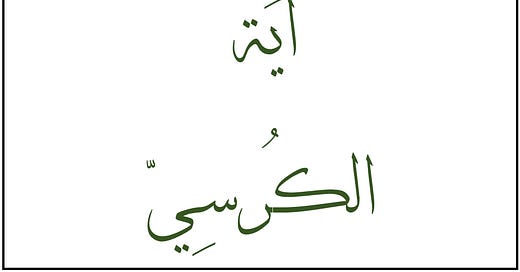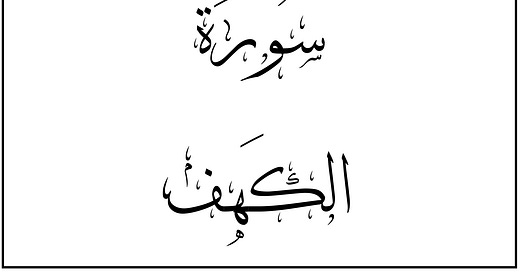
Why Study the Structure and Organization of the Quran?
The significance and possible benefits of studying the coherence of the Quran
We’re going to change things up a bit this week and discuss a topic that we haven’t written about explicitly yet; the significance of the study of the coherence of the Quran.
We’ve written plenty of posts on how the Quran is organized, but haven’t actually focused on why this discipline is important.
Purpose
One of the main reasons we created this blog was to dismantle the myth that the Quran is an unorganized text that “randomly” jumps from topic to topic, “lacks a coherent structure” and/or is compiled in an “unorganized” manner. The goal is to take a Muslim from asking, “Why does the Quran change topics so often? It seems arbitrary,” to “This can only be from Allah!”
Significance and Reasons
A cursory glance at tafsīr (scholarly explanatory works) is enough to appreciate the rich meaning embedded in every letter of the Quran. The lessons are endless, and the application of those wisdoms is a lifelong journey. But an often-overlooked aspect of the Quran is its organization. How do the āyāt come together to form a coherent whole whose placement of āyāt contributes to a well-organized and methodological message? And how might that structuring lend itself to uncovering deeper meanings not as apparent on an initial read through?
This blog doesn’t focus on the linear coherence of the Quran. That is an area wherein there is a plethora of scholarly works exploring the āyah-by-āyah wisdom of the Revelation. Instead, we tend to focus on a broader look at how entire suwar are organized and how their subject matter carries with it an organization that points to there being a divine author.
Why should one study how Allah ﷻ organized the placement of His āyāt? There are four of reasons worth discussing:
Allah ﷻ is the Best of Speakers and His Speech is the Best of All Speech - Allah ﷻ says in the beginning of Sūrah ar-Raḥmān,
The Most Merciful, He taught the Quran, created man, [and] taught him al-bayān.1
Bayān involves both expressing oneself and understanding what has been expressed by others. It can be defined as eloquence, clear speech, explaining, the ability to express oneself, or elucidating.
Allah ﷻ taught humans how to speak and part of communicating effectively is having organized speech. If all of coherent speech is clearly organized, what can be said of the speech of the Teacher of all speech? Part of the agreed upon definition of the Quran is that it is the inimitable speech of Allah ﷻ. Nothing can, or will, ever come close to His words in all praiseworthy manners. Allah ﷻ Himself calls the Quran “bayān,” so one should take note of how He organized His perfect words.
Additionally, in Sūrah al-Kahf Allah ﷻ says,
Say, ‘If the sea were ink for [writing] the words of my Lord, the sea would be exhausted before the words of my Lord were exhausted, even if We brought the like of it as a supplement.’2
And He ﷻ also says in Sūrah Luqmān,
And if whatever trees upon the earth were pens and the sea [was ink], replenished thereafter by seven [more] seas, the words of Allah would not be exhausted. Indeed, Allah is Exalted in Might and Wise.3
These āyāt point to Allah’s ability to articulate meanings with many layers of understanding. The more one delves into His āyāt, the more one benefits and finds. How He structured His words may be another layer on top of the already innumerable methods of accessing Allah’s words.
All of Creation is Organized4 – Humans are encouraged by Allah ﷻ in a number of āyāt to contemplate the harmony of His creation. In Sūrah al-Wāqi'ah Allah ﷻ says,
I swear by the positions of the stars–A mighty oath, if you only knew–that this is truly a noble Quran.5
Allah ﷻ tied the precision of the star’s positions to the Quran. If the heavens, the earth, the cells in our bodies and even the atoms forming those objects are organized, then how can the speech of Allah ﷻ not be?
Science and mathematics are essentially the study of how Allah ﷻ organized His creation. If not for the regular patterns one witnesses in the world, documenting observations into comprehensible textbooks and research papers would be near-impossible. Just as creation has a structure one can follow, the structure of Allah’s speech is just as observable.
There Are Claims That the Quran is Unorganized - There are many documented cases of non-Muslims critiquing the Quran for what they perceive to be a lack of cohesion. The famous French philosopher, Voltaire, wrote scathingly about Islam. On the Quran in particular he is recorded to have stated,
The Qur’an is a rhapsody without liaison, without order, without art; it is said nevertheless that this boring book is a very beautiful book–I am referring here to the Arabs, who pretend it is written with an elegance and a purity that no one has approached since.6
There are also those such as Thomas Carlyle who generally spoke favorably about Islam. He said in praise of the Messenger ﷺ,
It is a great shame for anyone to listen to the accusation that Islam is a lie and that Muhammad was a fabricator and a deceiver. We saw that he remained steadfast upon his principles, with firm determination; kind and generous, compassionate, pious, virtuous, with real manhood, hardworking and sincere. Besides all these qualities, he was lenient with others, tolerant, kind, cheerful and praiseworthy and perhaps he would joke and tease his companions. He was just, truthful, smart, pure, magnanimous and present-minded; his face was radiant as if he had lights within him to illuminate the darkest of nights; he was a great man by nature who was not educated in a school nor nurtured by a teacher as he was not in need of any of this.7
Which makes his criticism of the Quran all the more impactful when he said,
I must say, it is as toilsome reading as I ever undertook. A wearisome confused jumble, crude, incondite; endless iterations, long-windedness, entanglement [...] insupportable stupidity in short!8
Then there are the Muslims, though sincere in their questioning, who are confused about how Allah ﷻ organized His speech. What many fail to realize is that the Quran has its own standard of structure, one which is better than anything on offer from Allah’s creation. Despite the lofty standards, Allah ﷻ tells us in the beginning of Sūrah Yūsūf,
No doubt We sent it down as an Arabic Quran so that you all may understand [it].9
The coherence of the Quran is accessible, and this blog aims to demonstrate, at a surface level, how well-structured the Quran is.
It is a Potential Source for Interpreting the Quran - Tafsīr of the Quran with the Quran is one of the main sources for unlocking the Quran’s meanings. Imām al-Suyūṭī summarized this methodology saying,
The scholars have said: Whoever wishes to interpret the Quran, he should first turn to the Quran itself. This is because what has been narrated briefly in one place might be explained in detail in another place, and what is summarized in one place might be explained in another.10
In simpler terms, using the surrounding context can help to elucidate the meaning of Allah’s words. By understanding how Allah ﷻ organized the āyāt, qualified scholars may be able to uncover an additional layer of context by which to interpret a sūrah.
Tentative Conclusions
We believe the organization of the Quran is yet another argument for the miraculous nature of it. The Quran is originally an oral tradition, spoken by the Messenger ﷺ, without undergoing revisions, out of order, responding to real-time events, over 23 years, by an unlettered man, addressing issues as far ranging as politics, finances, spirituality, history, morals, law and ritual worship, and despite all of that, after it was arranged and compiled at the end of the 23-year period, we find an incredible structure and organization to it. We find ring structures, mirror structures, parallel structures and sometimes even structures within other structures and all without compromising on the perfection of the message itself.
As Mustansir Mir has detailed elsewhere11, the study of the Quran’s organization is a burgeoning field which has only recently had scholarship focused on its study. We pray that Muslims struggling with understanding the Quran’s unique structuring will take inspiration from this blog and begin discovering examples of organization in the Quran on their own.12 At the very least, we pray that if they come across a sūrah that they cannot understand the coherence of, they will know that a structure does exist, but they may need to reflect more to find it and understand it.
Additional Resources
If the topic of the Quran’s organization and structure interests you beyond what you may find on this blog, please check out:
Structure and Qur'anic Interpretation by Raymond Farris
A Tentative Guide to the Themes of the Surahs of the Qur’an by H.R.H. Prince Ghazi bin Muhammad
Divine Speech: Exploring Quran As Literature by Nouman Ali Khan and Sharif Randhawa
at-Tanāsubu bayn as-Suwar fi l-muftatahi wal-Khawātīm by Dr Fāḍil Ṣaliḥ as-Samarrāī'
Mafatīḥ al-Ghayb by Imam ar-Razi
Ar-Rūh al-Ma'ānī fī Tafsīri-l-Qur'āni-l-'Aẓīm wa Sab'u-l-Mathānī by al-Ālūsī
al-Baḥr al-Muḥīṭ by Abi Hayyaan
Dalālil an-Niẓām by Hamīduddīn al-Farāhī
The many papers written by Mustansir Mir
The various works of Shaykh Hamīduddīn al-Farāhī and his student Shaykh Amīn Aḥsan Iṣlāḥi
And Allah knows best - والله أعلم
55:1-4 - الرَّحْمَـٰنُ * عَلَّمَ الْقُرْآنَ * خَلَقَ الْإِنسَانَ * عَلَّمَهُ الْبَيَانَ
18:109- قُل لَّوْ كَانَ الْبَحْرُ مِدَادًا لِّكَلِمَاتِ رَبِّي لَنَفِدَ الْبَحْرُ قَبْلَ أَن تَنفَدَ كَلِمَاتُ رَبِّي وَلَوْ جِئْنَا بِمِثْلِهِ مَدَدًا
31:27 - وَلَوْ أَنَّمَا فِي الْأَرْضِ مِن شَجَرَةٍ أَقْلَامٌ وَالْبَحْرُ يَمُدُّهُ مِن بَعْدِهِ سَبْعَةُ أَبْحُرٍ مَّا نَفِدَتْ كَلِمَاتُ اللَّـهِ ۗ إِنَّ اللَّـهَ عَزِيزٌ حَكِيمٌ
This point is argued in more detail by Shaykh Hamīduddīn al-Farāhī in his book, Dalāil an-Niẓām
56:75 - فَلَا أُقْسِمُ بِمَوَاقِعِ النُّجُومِ * وَإِنَّهُ لَقَسَمٌ لَّوْ تَعْلَمُونَ عَظِيمٌ * إِنَّهُ لَقُرْآنٌ كَرِيمٌ
Voltaire, “Alcoran” in Dictionnaire de philosophie, cited in Michel Cuypers and Geneviève Gobillot, Le Coran (Paris: Le Cavalier Bleu, 2007)
Carlyle, Thomas Carlyle, On Heroes, Hero Worship and the Heroic in History, ed. Archibald MacMechan (Boston: Athenaeum, 1901)
Ibid
12:2 - إِنَّا أَنزَلْنَاهُ قُرْآنًا عَرَبِيًّا لَّعَلَّكُمْ تَعْقِلُون
al-Suyūṭī, Al-Itqān fī 'ulūm al-Qurān
See Coherence in the Qurʿān – A Study of Iṣlāḥi's Concept of Naẓm in Tadabbur-l Qurʿān
Thanks to those who have been generous enough to share their structure discoveries with us! If we haven’t already published them, we’ll be publishing them soon!











Asalaamualaikum. I just started following this newsletter. Wonderful insight and inquiry, mashallah.
I wanted to ask if you've published any post relating to when and how the Quran was actually organized. Presuming it was organized by the sahaba, do we have insight into how they made the decision to organize and was there divine guidance involved?